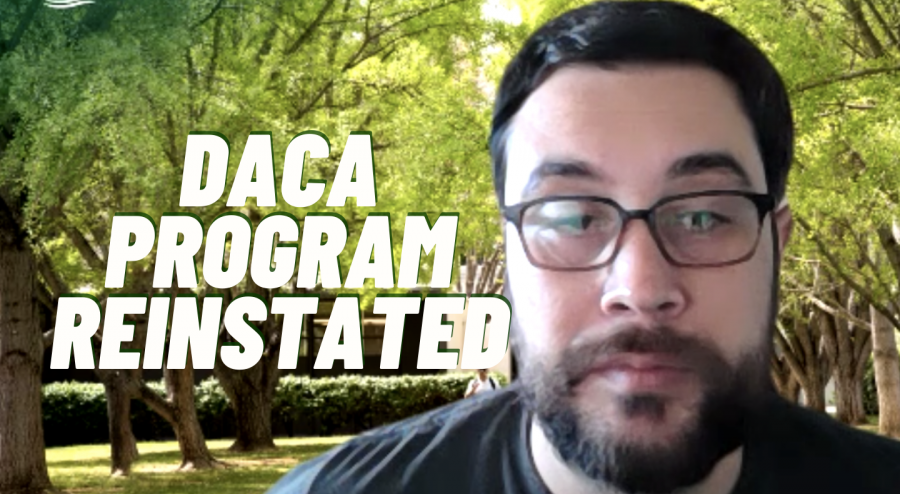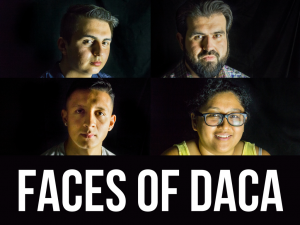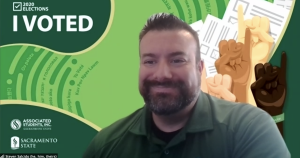DACA reinstated for first time since 2017
Judge orders Trump administration to accept new applications this week
A judge ordered the Trump administration to fully reinstate the Deferred Action for Childhood Arrivals program that was ended in 2017. Program coordinator for the Dreamer Resource Center Erik Ramirez said DACA will protect undocumented young immigrants from deportation and let them work lawfully. Screenshot taken via Zoom.
December 9, 2020
For the first time since September 2017, young undocumented immigrants will be eligible to apply for deportation protection and work authorization after a new order filed Friday, Dec. 4.
Judge Nicholas Garaufis of the U.S. District Court in Brooklyn ordered the Department of Homeland Security and President Donald Trump’s administration to fully reinstate the Deferred Action for Childhood Arrivals program, known as DACA, three years after Trump’s administration ended the program in September 2017.
The program, created under former President Barack Obama’s administration, allows undocumented individuals who were brought into the United States as children the opportunity to work and be temporarily protected from deportation. Garaufis ordered the DHS to begin accepting applications as of Dec. 7.
Garaufis first issued an opinion Nov. 14 stating that the Department of Homeland Security’s acting secretary Chad F. Wolf’s July 2020 memorandum was invalid because the DHS “failed to follow its order of succession, as it was lawfully designated under the Homeland Security Act.”
The DHS is now accepting initial DACA applications, renewal requests and applications to advance parole documents that allow DACA recipients to travel in and out of the country. Deferred action and employment only lasts for two years and consistently needs to be renewed. The government will also be extending DACA and employment authorization documents that allow recipients to work from one year to two.
According to the Center for American Progress, DACA currently protects approximately 640,000 young undocumented immigrants and there could be 300,000 new eligible applicants.
RELATED: ‘Nothing in my life is secure’: Sac State DACA recipients speak out
“Our hope is that individuals will be able to apply and have a little more security in their future,” said Andres Guerra, the supervising staff attorney for student legal service at the Coalition For Humane Immigrant Rights, or CHIRLA. “In both an academic level in terms of being able to afford tuition and other expenses but also on a personal level to have that protection against deportation that comes with DACA.”
Guerra said CHIRLA received a grant in 2019 to do immigration consultations and legal services for every California State University and community college student across California.
“We anticipate that the reinstatement of DACA is a moment of hope and opportunity for students, but we also think it’s a small window of time for individuals to work diligently to get the protections they need,” Guerra said.
Guerra said a pending federal court case meant to take place Dec. 22 in Texas is another challenge for the DACA program. The court case will decide the legality of the DACA program.
“That’s something that has been unique about this administration, generally there’s some predictability, but that sort of all went out the window in 2017,” Guerra said, “It’s going to be a curious couple of weeks – the judge has already signaled that he thinks it’s illegal, and he already struck down a similar program in 2016.”
Guerra said CHIRLA has an office in Washington, D.C. where they have individuals with their “ear to the ground on not only policy changes but also the current status of different cases in the court systems” that allows them to prepare as an organization. According to him, they’re already collected initial applicants’ evidence and filled out forms to send applications out soon.
Guerra said there are many nonprofits working to file as many cases as possible before Dec. 22 and encourages undocumented immigrants to be be aware of negative services out there. According to him, CHIRLA has been hearing reports of people being charged $7,000 for a DACA application, a service that has a market price of approximately $500-$1,000.
“People know how desperate these vulnerable populations are and they know how time sensitive things are, so they figure they could make an easy buck,” Guerra said. “I would also encourage individuals to know that they don’t have to pay that high of an amount for quality service.”
DACA’s reinstatement offers students protection from deportation and the ability to work lawfully according to Erik Ramirez, the program coordinator from Sacramento State’s Dreamer Resource Center.
“The full reinstatement of DACA and our students being able to apply would be amazing and would be significantly impactful on their lives, dreams, and successes,” said Ramirez.
The Dreamer Resource Center offers free immmigration clinics, free legal services and financial aid and academic guidance for students who experience unique challenges as a result of their undocumented or mixed status. The center also hosts community events, policy briefings and ally training. Not only do they serve the campus, but Ramirez said they are a resource for the Sacramento region as well.
Ramirez said the center has received approximately two dozen inquiries via phone call, email and Instagram direct message about the announcement and what it means. According to him, the center oftentimes refers students to immigration attorneys due to the differences in individual cases.
“The thing about DACA is things change very quickly, you have to be very careful about the information you’re putting out there,” Ramirez said.
He said information needs to be vetted, and that the center relies on legal experts like Guerra to ensure it is offering up-to-date, accurate information due to the nuances of immigration policy.
“Legal experts expect a ruling against DACA. Does that takeover the ruling that was issued a couple of days ago? It makes it really hard what to know to tell students and how to get this information out there about what’s not available to our students,” Ramirez said.
Ramirez said that undocumented and mixed-status students who are familiar with the uncertainty of DACA are excited but skeptical. He said students may be used to the feeling of “maybe, but.”
“The nature of this work, by default, is kind of like you have to be ready for everything because federal policy changes, immigration laws change,” Ramirez said. “We have the president of the United States tweeting things about mass raids on certain weekends, and we have to respond to that, our students need that.”
The Dreamer Resource Center is available Monday through Friday from 8 a.m. to 5 p.m. and will also be available through the winter break.




























































































































